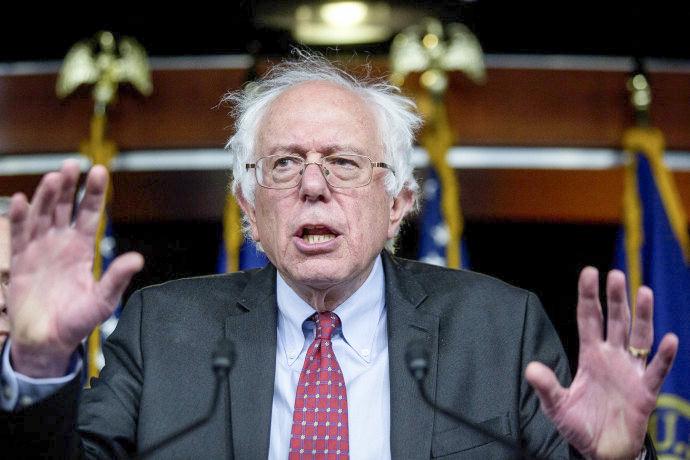
Democratic presidential candidate Bernie Sanders is gaining attention and support in recent polls, showing the self-described Democratic Socialist will likely not be fading away anytime soon.
According to [CBS News](http://www.cbsnews.com/news/poll-hillary-clinton-still-leads-democratic-race/), the Vermont senator has 27 percent support, up 10 percent since [July](http://www.scribd.com/doc/273549998/Topline-CBS-Dems-8-4-15-Poll-1) . The Democratic frontrunner, former Secretary of State Hillary Clinton, has seen a drop of 12 percent support in the same time, leaving her at 46 percent.
Sanders’ [platform](https://berniesanders.com/issues/) includes raising minimum wage, reducing present student debt and making universities’ tuition free through taxes, and expanding social security and workers’ time off for medical leave and vacation. Sanders has proclaimed support for gay marriage and abortion, as well as supporting government funding of Planned Parenthood.
Sanders has gained widespread attention for his radical ideals, with some hailing and others criticizing him for them.
“I think he needs to come back more moderate because he’s scaring voters that are thinking about policy with the money it would cost,” freshman Democrat Nico Adame said. “But unfortunately, it’s not a matter of whether he should. It’s a matter of whether he can. Other candidates have been sunk because they flip flop. If he starts moving right now, he’ll sink. And to add to that, he can win with his radical ideas. If he comes back right, he meshes too much with others and doesn’t stick out.”
The New York native’s platform has been described as “idealistic” by some, who question how hefty of a bill it would realistically put on the U.S. government.
“The reason he’s getting where he is, is that people have yet to really consider policy and money and they like the talk,” Adame said. “He’s a good candidate, but his fiscal questions certainly cause me to raise my eyebrows.”
Sophomore Republican Travis Meier feels that Sanders, if elected president, would make America look more “ordinary” and lower the standard of living.
“People look at us and see a giant power, of industry, freedom, democracy, innovation and they see that and they kind of marvel at us — we’re pretty much the most powerful power in the world right now,” Meier said. “If he were to be elected president, I would not doubt that a lot of his plans would not only endanger us more financially but hinder us as a nation to where (individuals) would be brought down to a little more of an equal level, but also that level would be a much lower living standard than we’re used to right now.”
Sanders’ political career started in 1981, when he was elected as the mayor of Burlington, Vermont, by a margin of 10 votes. He was elected to the U.S. House of Representatives in 1990 as an independent, the first elected into the house in 40 years. He opposed the Iraq war, but he did sign the 2001 Authorization for Use of Military Force Against Terrorists, which authorized necessary and appropriate force against terrorists involved in the 9/11 attacks. He joined the Senate in 2006 with Democratic support, and in August 2011 had a [67 percent](http://www.publicpolicypolling.com/pdf/2011/PPP_Release_VT_0802424.pdf) approval rating, making him the third-most-popular senator in the nation at the time.
Sanders officially announced his run for president May 26 in Burlington, Vermont, at a rally just as unconventional as his campaign that The Atlantic [described](http://www.theatlantic.com/politics/archive/2015/05/bernie-sanders-launches-his-run-for-president-in-2016/394118/) as “more like a festival,” including free ice cream and music.
“Today, with your support and the support of millions of people throughout this country, we begin a political revolution to transform our country economically, politically, socially and environmentally,” Sanders said in his announcement. “Today, we stand here and say loudly and clearly that enough is enough. This great nation and its government belong to all of the people, and not to a handful of billionaires, their Super-PACs and their lobbyists.”
Sanders and many of his supporters have criticized the wealthy and corporate America, with stickers saying, “Billionaires can’t buy Bernie.”
“Let us wage a moral and political war against the billionaires and corporate leaders, on Wall Street and elsewhere, whose policies and greed are destroying the middle class of America,” Sanders said at the United Against The War On Women Event in 2012.
While some hail Sanders for his support for the middle class, others feel that his beliefs go against America’s foundation.
“I would say maybe sometimes people are born into families where they get the silver spoon, and that’s how life is, but overall, I would say that it’s not fair to criticize the wealthy,” Meier said. “I think a lot of the wealthy get to where they are today through hard work and determination, kind of that Jacksonian mindset of the self-made man, and that’s pretty much what America has been about ever since it’s founding. If we’re going to criticize that and say that’s not good and they need to distribute their wealth to other people then we’re no longer what we used to be, what we were founded on and what we grew up on to make us the great nation that we are.”
Meier said he thinks that Sanders’ socialist platform would cause Americans to be less motivated to work hard.
“If you’re just going to work hard just to get to a point where most of your wealth is redistributed then why give 100 percent at that point,” Meier said. “If you’re busting your tail while other people are napping and then the fruits of your labor are given away what incentive is there to do any work anymore?”
Mid-Missourians for Bernie Sanders, an entirely volunteer-based, grassroots organization supporting the senator, is planning several events for supporters to get involved at, including debate watch parties and the Broke Billionaires for Bernie fundraising costume party on Nov. 7.